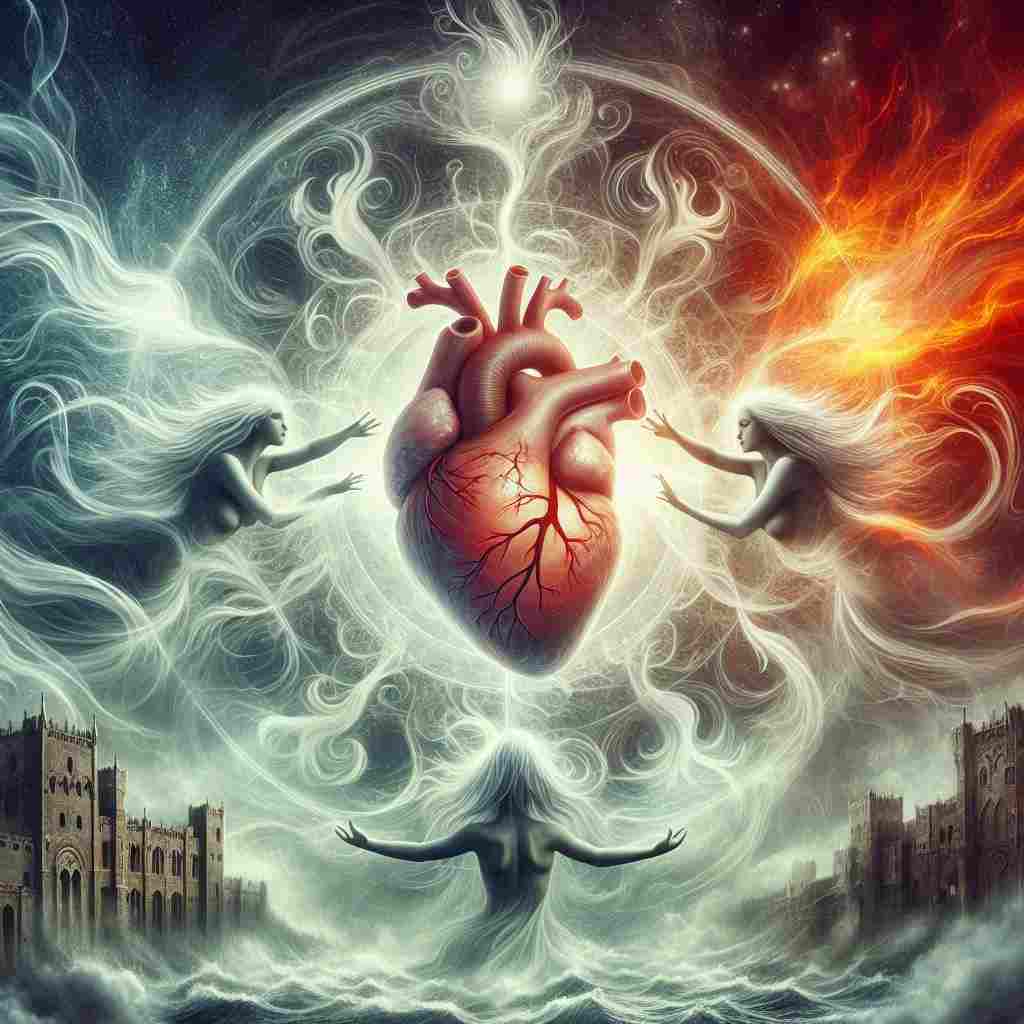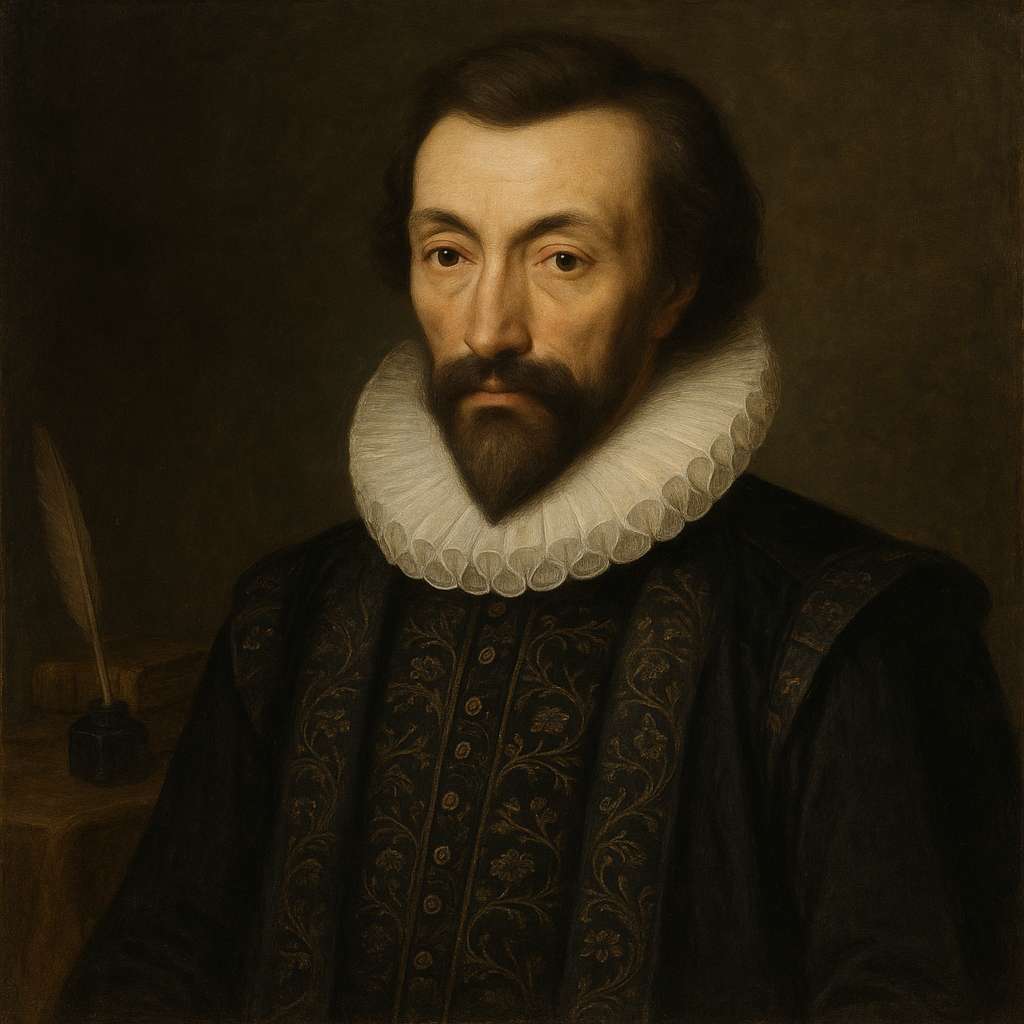Batter my heart, three-person'd God
John Donne
1572 to 1631

Batter my heart, three-person'd God, for you
As yet but knock, breathe, shine, and seek to mend;
That I may rise and stand, o'erthrow me, and bend
Your force to break, blow, burn, and make me new.
I, like an usurp'd town to another due,
Labor to admit you, but oh, to no end;
Reason, your viceroy in me, me should defend,
But is captiv'd, and proves weak or untrue.
Yet dearly I love you, and would be lov'd fain,
But am betroth'd unto your enemy;
Divorce me, untie or break that knot again,
Take me to you, imprison me, for I,
Except you enthrall me, never shall be free,
Nor ever chaste, except you ravish me.
John Donne's Batter my heart, three-person'd God
John Donne's Holy Sonnet XIV, "Batter my heart, three-person'd God," stands as a testament to the poet's mastery of the metaphysical conceit and his profound engagement with the complexities of faith. This sonnet, part of Donne's series of Divine Meditations, encapsulates the turbulent relationship between the human soul and the divine, rendered through a tapestry of violent imagery, sensual language, and paradoxical concepts. In this analysis, we will explore the multifaceted nature of Donne's poetic craft, examining how he employs structure, imagery, and theological concepts to create a work that continues to resonate with readers across centuries.
Structural Analysis: The Sonnet Form as Spiritual Battlefield
Donne's choice of the sonnet form is significant, as it provides a tightly controlled structure within which he can explore the chaotic emotions of spiritual longing. The poem follows the Petrarchan sonnet structure, with an octave (first eight lines) and a sestet (final six lines), but Donne subverts the traditional volta or turn between these sections. Instead, he maintains a consistent tone of urgent pleading throughout, reflecting the speaker's unrelenting desire for divine intervention.
The rhyme scheme (ABBAABBACDCDEE) contributes to the poem's sense of struggle and resolution. The interlocking rhymes of the octave (ABBAABBA) create a sense of entrapment, mirroring the speaker's feeling of being caught between his desires and his shortcomings. The shift to alternating rhymes in the sestet (CDCD) suggests a loosening of this constriction, while the final couplet (EE) provides a powerful, emphatic conclusion to the speaker's plea.
Imagery and Metaphor: Violence as a Path to Salvation
One of the most striking aspects of "Batter my heart" is its use of violent and militaristic imagery to describe the desired relationship between God and the speaker. This paradoxical concept of "violent grace" permeates the poem, challenging conventional notions of divine love and human devotion.
The opening line, "Batter my heart, three-person'd God," immediately establishes this violent tone. The verb "batter" evokes images of assault and destruction, yet it is framed as a desperate request. This juxtaposition of violence and desire continues throughout the poem, with phrases like "o'erthrow me," "break, blow, burn," and "imprison me" painting a picture of divine love as an overwhelming, transformative force.
Donne extends this martial metaphor by comparing the speaker's soul to an "usurp'd town." This complex conceit allows him to explore themes of conquest, occupation, and liberation. The speaker sees himself as a captured city, with Reason serving as God's "viceroy" but failing in its duty to defend against sin. This metaphor underscores the internal struggle between faith and human weakness, while also emphasizing the speaker's desire for God to take complete control.
Paradox and Antithesis: The Complexity of Faith
Central to the poem's power is Donne's masterful use of paradox and antithesis. These rhetorical devices allow him to express the seemingly contradictory nature of spiritual experience and the mystery of divine love.
The most prominent paradox is the idea that true freedom can only be achieved through complete submission to God. This concept is encapsulated in the lines "Except you enthrall me, never shall be free, / Nor ever chaste, except you ravish me." Here, Donne plays with the dual meanings of words like "enthrall" (to enslave, but also to captivate) and "ravish" (to rape, but also to enrapture), creating a complex web of meanings that reflect the multifaceted nature of the speaker's relationship with God.
Another significant antithesis is presented in the contrast between God's gentle actions ("knock, breathe, shine, and seek to mend") and the violent intervention the speaker craves. This opposition highlights the insufficiency of mild approaches in the face of deep-seated sin and the need for radical transformation.
Theological Implications: Trinity and Redemption
The poem's opening address to the "three-person'd God" immediately situates it within the Christian doctrine of the Trinity. This concept of God as simultaneously three and one serves as a theological foundation for the poem's exploration of paradox and unity.
Moreover, the violent imagery of the poem can be read as an allusion to the Christian concept of redemption through Christ's sacrifice. The speaker's desire to be broken and remade echoes the idea of spiritual rebirth, while the language of imprisonment and ravishment evokes the transformative power of divine grace.
The poem also grapples with the complex relationship between human free will and divine sovereignty. The speaker's plea for God to "divorce me, untie or break that knot again" suggests a recognition of his own inability to break free from sin, while also acknowledging the need for divine intervention to sever his attachment to worldly desires.
Language and Sound: The Music of Devotion
Donne's mastery of language is evident in the poem's sonic qualities. The use of alliteration and assonance creates a rhythmic intensity that mirrors the speaker's passionate plea. For example, the line "break, blow, burn, and make me new" uses plosive 'b' sounds and the repetition of short vowels to create a sense of forceful, staccato action.
The poem's meter, while generally iambic pentameter, contains several variations that add to its emotional impact. The first line, for instance, begins with a trochee ("Batter") rather than an iamb, immediately setting a tone of urgency and disruption.
Conclusion: The Enduring Power of Donne's Craft
"Batter my heart, three-person'd God" stands as a testament to John Donne's poetic genius and his ability to articulate the complex, often contradictory nature of religious experience. Through his skillful use of form, imagery, paradox, and sound, Donne creates a work that is at once deeply personal and universally resonant.
The poem's enduring power lies in its unflinching exploration of the human condition and its relationship to the divine. By framing spiritual longing in terms of violent conquest and passionate desire, Donne challenges his readers to consider the radical nature of faith and the transformative potential of divine love.
Moreover, the poem's complexity and layers of meaning ensure its continued relevance across centuries. Whether read as a deeply personal expression of faith, a meditation on the nature of free will and predestination, or an exploration of the power dynamics inherent in human-divine relationships, "Batter my heart" continues to offer new insights and provoke profound questions.
In the end, Donne's sonnet reminds us that true spiritual transformation often requires a willingness to be broken and remade. It stands as a powerful testament to the paradoxical nature of faith, where strength is found in submission, freedom in captivity, and ultimate fulfillment in complete surrender to divine love.
This text was generated by AI and is for reference only. Learn more
Want to join the discussion? Reopen or create a unique username to comment. No personal details required!



Comments
No comments yet. Be the first to comment!